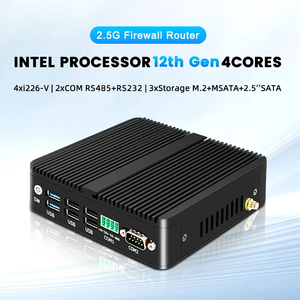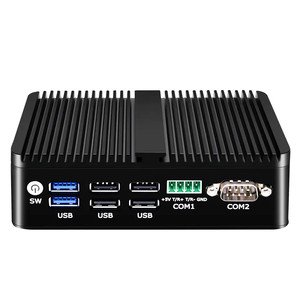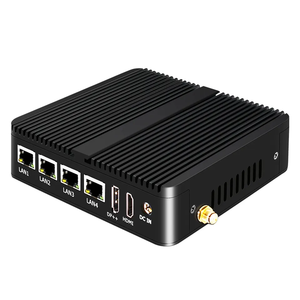
All categories
Featured selections
Trade Assurance
Buyer Central
Help Center
Get the app
Become a supplier

(2415 products available)







































Firewalls serve as a barrier that protects a network from unauthorized access. They examine incoming and outgoing traffic and decide whether to allow it through, based on predefined security rules. Huawei firewalls can be broadly classified into two main types: network firewalls and application-layer firewalls.
These are the traditional firewalls that monitor and control traffic at a network level. They operate at the network layer of the Open Systems Interconnection (OSI) model, filtering and inspecting packets based on parameters such as IP addresses, ports, and protocol. Huawei's network firewalls provide basic security measures, such as stateful packet inspection, network address translation (NAT), and virtual private network (VPN) support. They also offer more advanced features like intrusion prevention, anti-malware, and web content filtering.
NGFW are an evolution of traditional network firewalls. They incorporate additional capabilities beyond the typical stateful inspection of packets. NGFWs offer more enhanced features like deep packet inspection, application awareness, and granular access control. They also include advanced security functions such as intrusion prevention systems, SSL inspection, and sandboxing. NGFWs are designed to provide more comprehensive protection for modern networks, which is why they are the preferred firewall option for many organizations.
Firewalls are available as hardware appliances, virtual machines, or cloud-based services. Hardware appliances are physical devices that can be installed on-premises within a data center or at the network perimeter. They tend to offer better performance and scalability, especially for high-throughput environments.
On the other hand, virtual firewalls are software-based instances that can be deployed on virtualized infrastructure. They provide more flexibility and cost savings, particularly for organizations that are already utilizing virtualization technologies. Cloud-based firewalls, as the name suggests, are firewalls delivered as a service from the cloud. They are ideal for securing cloud environments and remote users. Depending on the vendor, cloud-based firewalls may be offered as a standalone solution or integrated with other cloud security services.
A Huawei next-generation firewall provides stateful packet filtering (SPF) to authenticate, authorize, and account (AAA) for secure access control. It also offers network address translation (NAT) to map private IP addresses to the public and application layer gateway to allow or deny specific applications.
It has a self-learning system to identify known and unknown threats, and it provides real-time threat intelligence to protect against intrusion and advanced persistent threats.
It provides web filtering, application control, and sandboxing to protect against web-based malware and rogue applications. It ensures compliance with industry regulations and secures web applications.
It provides protection for endpoints like laptops, desktops, mobile devices, and servers. It has antivirus software, device control, application control, and encryption to protect the network from attacks that may come from the endpoint.
It provides protection for mobile devices connected to the network. It has mobile device management to control what devices can access the network and what they can do on the network.
It provides secure access for users and devices connecting to the corporate network from remote locations. It uses SSL VPNs, which are web-based, or IPsec VPNs, which are client-based.
It provides security for wireless networks using features like WPA, WPA2, and WPA3 encryption, Wi-Fi protected access, and intrusion detection to protect against unauthorized access.
A Huawei firewall provides secure communication between two or more networks. It creates an encrypted tunnel to transmit data over the internet. This ensures that data is secure and private during transmission. The firewall protects the VPN from unauthorized access and ensures that only authorized users can access the network.
It provides protection for web applications by monitoring, detecting, and blocking attacks. This ensures that the applications are secure and not vulnerable to exploits. The firewall can also encrypt application data to prevent unauthorized access.
This prevents malware from infecting the network. It scans traffic in real-time to detect and block viruses, worms, and other malware. It also provides regular updates to ensure that it can detect the latest threats.
The Huawei next generation firewall has many usage scenarios. They are mainly used to secure the network, enable safe access to services, and provide visibility and control. Some of the common usage scenarios of the Huawei next generation firewall include the following:
With the increase in remote work, organizations are using the Huawei firewall to secure remote access for their employees. The firewall provides secure access to company resources from any location or device outside the corporate network. It enforces security policies and protects against threats to ensure secure remote work.
The Huawei firewall is also used to enhance data center security. It provides network segmentation to separate workloads and applications. Additionally, the firewall inspects traffic to and from the data center to detect and prevent cyber threats.
Many organizations are moving their workloads and applications to the cloud. The Huawei firewall provides cloud security by securing cloud-based applications and workloads. It also monitors cloud traffic to detect and prevent cloud-related threats.
The Huawei firewall works well as an internet gateway security solution. It protects the organization's network against internet-based threats. The firewall inspects web traffic to block malicious content and malware. It enforces web usage policies and ensures compliance with regulations.
The Huawei firewall also works well in securing branch offices. It provides secure connectivity between the branch office and the main data center. The firewall also enforces security policies and protects against threats to ensure branch office security.
The Huawei firewall also plays a key role in mobile security. It is used to secure mobile devices and their connections to the corporate network. The firewall enforces access control and security policies to protect against mobile-related threats.
The Huawei firewall is also used to secure the Internet of Things (IoT) devices. It is used to monitor and control IoT device communication. Additionally, the firewall protects against IoT-related threats and vulnerabilities to ensure IoT security.
When choosing a firewall, it is essential to consider the organization's needs and requirements so that the right solution is implemented. Some of the things to consider are:
Q1: What is the latest version of Huawei's NGFW?
A1: The latest version of the firewall is the USG6600 series, which includes the USG6650, USG6660, and USG6670 models. The series has a faster processing speed and more capacity than other previous models.
Q2: How does a Huawei firewall work?
A2: A Huawei firewall works by creating a barrier between a trusted internal network and untrusted external networks, such as the internet. It does this by monitoring all incoming and outgoing network traffic based on an organization's security rules or policies. If the firewall detects any traffic that violates these rules, it will block or allow the traffic accordingly.
Q3: What are the benefits of using a Huawei firewall?
A3: There are many benefits to using a Huawei firewall. Some of the main ones include protecting against unauthorized access, preventing malware, and improving network performance.
Q4: What features should be considered before buying a Huawei firewall?
A4: Before buying a Huawei firewall, it is important to consider what features are required. For instance, each firewall has different features, such as built-in VPN support, intrusion detection, and content filtering. It is important to ensure that the firewall has the features that are necessary for the business.
Q5: What support does Huawei offer for its firewalls?
A5: Huawei offers different levels of support for its firewall products. This may vary according to the product. It is advisable to check with the support team to find out what type of support is available for a specific product. Some common types of support include software updates, technical support, and hardware repair services.